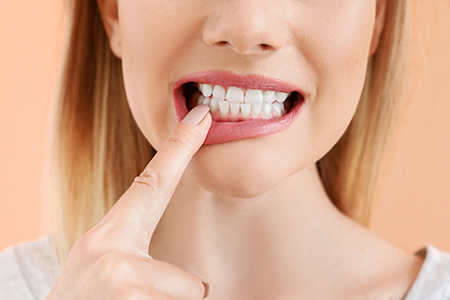Contact Us
Schedule your appointment online or give us a call to get started today.

Gum disease remains the leading cause of adult tooth loss, but it doesn’t have to be inevitable. Studies show periodontal conditions affect a large portion of adults, yet many cases can be prevented or managed when detected early. At Black Mountain Family Dentistry, we focus on clear explanations, modern diagnostics, and individualized care so patients understand their condition and the practical steps to protect their smiles.
Periodontal disease is not a single event but a spectrum of inflammatory conditions that affect the tissues supporting your teeth — the gums, connective fibers, and the underlying bone. The driving force behind this process is bacterial biofilm (plaque) that accumulates at and below the gumline. Over time, without effective removal, this biofilm hardens into calculus and triggers inflammation.
One reason periodontal disease can be so insidious is that early stages are often painless. The body’s inflammatory response may be active while you feel perfectly fine, which is why routine dental exams and professional cleanings are critical. These visits let dental professionals detect subtle changes before permanent damage occurs.
Understanding the mechanics — bacteria, immune response, and tissue breakdown — helps people see why daily brushing and flossing, combined with professional care, are the most effective tools for preventing progression and preserving tooth support.
Common signs to watch for include:
Red, swollen, or tender gums
Bleeding during brushing or flossing
Gum recession or exposed root surfaces
Sensitivity to hot, cold, or sweet stimuli
Persistent bad breath or a metallic taste
Teeth that feel loose or shifting spacing
Changes in how partial dentures fit
Pus or discharge around the gumline
Discomfort when biting or chewing

The mouth is part of the body’s ecosystem, and chronic inflammation in the gums can have ripple effects beyond the oral cavity. Research continues to explore associations between periodontal disease and conditions such as cardiovascular disease, diabetes, and respiratory illness. While these relationships are complex, reducing oral inflammation is a meaningful step toward supporting whole-body health.
Good periodontal care is therefore more than a local intervention: it’s preventive medicine. Controlling bacterial load and inflammation in the mouth can reduce systemic stressors and help people maintain better health overall, especially when paired with healthy lifestyle choices and medical management of chronic conditions.
Our team emphasizes prevention and early intervention because stopping inflammation before it becomes destructive protects both oral structures and broader wellness. Regular exams allow us to tailor a plan that aligns with each patient’s medical history and risk factors.
Gingivitis is the earliest, reversible stage of gum disease. It arises when plaque irritates the gum tissue, producing redness, swelling, and bleeding. These symptoms are signals that the body is trying to fight bacterial accumulation, and they usually respond well to improved oral hygiene and professional cleaning.
Treatment for gingivitis is intentionally straightforward: remove the irritant and give the gums a chance to heal. A thorough cleaning, coupled with instruction on effective brushing and interdental cleaning, typically restores tissue health when patients are consistent with home care.
Because gingivitis is reversible, early detection is an excellent opportunity to avoid more invasive care. That’s why routine dental assessments are so valuable — they let us identify inflammation when conservative measures are likely to succeed.

If inflammation is left unmanaged, gingivitis can progress to periodontitis, a condition in which the connective tissues and bone anchoring teeth are compromised. This progression creates pockets between the tooth and gum where bacteria thrive, accelerating tissue breakdown and, ultimately, increasing the risk of tooth loss.
Periodontitis can vary in severity and speed of progression. Contributing factors include smoking, poorly controlled diabetes, certain medications, genetic predisposition, and immune system differences. Identifying these risks helps clinicians design a treatment approach that addresses both local disease and contributing systemic conditions.
Treatment goals at this stage focus on halting infection, reducing pocket depth, and preserving as much of the natural tooth support as possible. Using a combination of clinical assessment, radiographs, and careful probing, clinicians form a plan that reflects the specific needs of the patient.
Contemporary periodontal care begins with the least invasive methods and escalates only as necessary. For many patients, non-surgical strategies — including professional scaling to remove plaque and calculus, local antimicrobial therapies, and a reinforced home-care regimen — can meaningfully reduce inflammation and restore healthier gum contours.
When non-surgical care does not achieve the desired result, or when deeper pockets and bone loss are present, surgical interventions may be recommended. These procedures are tailored to remove stubborn bacterial deposits, reduce pocket depth, and, when appropriate, regenerate lost bone and soft tissue using grafting techniques or other biologically guided methods.
Minimally invasive technologies such as selective laser therapy can complement traditional techniques, helping to reduce bacterial load and support healing in select cases. The choice of tools and methods depends on the clinical situation and the patient’s overall health goals.

For many cases, a series of deep cleanings — known as scaling and root planing — serves as the foundation of treatment. This process removes hardened deposits from below the gumline and smooths the root surfaces so the tissue can reattach more effectively. In some instances, adjunctive antimicrobials are placed locally to reduce bacterial counts and support healing.
Follow-up care is an essential part of conservative treatment. Periodic maintenance visits allow clinicians to monitor pocket depth, inflammation levels, and the effectiveness of at-home hygiene practices. When maintained properly, many patients experience long-term stability without needing surgical intervention.
When structural damage is advanced, surgical techniques can restore a more manageable environment for oral health. Flap procedures allow clinicians to access and thoroughly clean deep pockets, reshape damaged hard tissues, and reposition gums for improved function and easier cleaning. Where bone loss has occurred, grafting and regenerative materials can encourage the body to rebuild supporting structures.
Successful surgical outcomes rely on careful planning, precise execution, and a commitment to postoperative care. With modern materials and techniques, many patients regain improved function and aesthetics while protecting remaining dentition.
Whether your condition is limited to reversible gingivitis or requires more advanced intervention, the most important step is an accurate assessment and a clear, personalized plan. Our team emphasizes patient education, practical prevention strategies, and evidence-based treatment so you can make informed decisions about your care.
If you’d like to learn more about periodontal treatment options or schedule an evaluation, please contact us for more information.
Most people don’t realize that periodontal disease is the leading cause of tooth loss among adults. According to statistics from the Centers for Disease Control and Prevention, one out of every two adults over the age of 30 in the United States has periodontal disease.
You may be surprised to learn that the human mouth is home to a wide variety of microbes. The fact is that over 700 different strains of bacteria have been detected in the oral cavity. Although some of these bacteria are beneficial, others are harmful to oral health. Without proper oral hygiene and routine dental care, these harmful bacteria can cause tooth decay and gum disease, compromising both your oral health and overall wellbeing.
In addition to inadequate oral hygiene and infrequent professional care, other factors, including smoking, genetic tendencies, and unchecked diabetes, can contribute to the escalation of periodontal disease.
Your gums and teeth have an interdependent relationship, which means healthy teeth depend on the support of healthy gums. Also, taking care of your smile does more than keep your teeth and gums in optimal condition; good oral health also supports systemic health. In addition to being the leading cause of tooth loss in adults, researchers are finding more and more links between periodontal disease and a number of medical problems, including heart disease, stroke, diabetes, respiratory problems, and adverse pregnancy outcomes such as pre-term and low birth-weight babies.
If you notice that your gums are bleeding with the slightest pressure while brushing or flossing, it’s a sign of gingivitis. Although gingivitis is the earliest stage of gum disease, it can easily be reversed with deeper cleanings as well as an improved regimen of oral hygiene at home.
In the absence of professional treatment and better home care, gingivitis progresses to the next stage, which is known as periodontitis. In this stage, the connective tissue and bone that hold the teeth in place begin to break down with an increase in pocketing between the teeth and bone, gum recession, and bone loss. Without proper treatment by your dentist, periodontitis will progress from a mild to moderate loss of supporting tissue to the destruction of the bone around the teeth.
Although gingivitis can often be reversed with improved oral hygiene and professional cleanings, as periodontal disease advances, more extensive procedures are required to halt its progression. Based on a complete assessment of your periodontal health and a review of possible contributing factors, our office will recommend the best options in care. Treatment for periodontitis may include a series of deeper cleanings known as root planing and scaling, surgical procedures to reduce pocket depth, bone or tissue grafts, laser procedures, or antimicrobial medications.
The cost of care depends on the type of procedures required to restore your periodontal health. If you have dental insurance, plans often cover treatment to prevent gum disease as well as many procedures to treat the various stages of gum disease. Our goal is to help patients restore and maintain good oral health. We do all we can to help you begin care without additional stress or delay. Our business office works with you to maximize your benefits and provide easier, more convenient payment options.
By seeing our office regularly for care and doing your best to eat a healthy diet and practice good oral hygiene, you can keep your smile in tip-top shape as well as protect your overall wellbeing.
At the office of Black Mountain Family Dentistry, we provide a comprehensive range of services to address all your oral healthcare needs. You can rest assured that your smile is in the best of hands at our office. Our skilled and experienced team maintains a position at the forefront of advances in care and remains dedicated to providing the highest quality of skilled and compassionate treatment.
Schedule your appointment online or give us a call to get started today.
